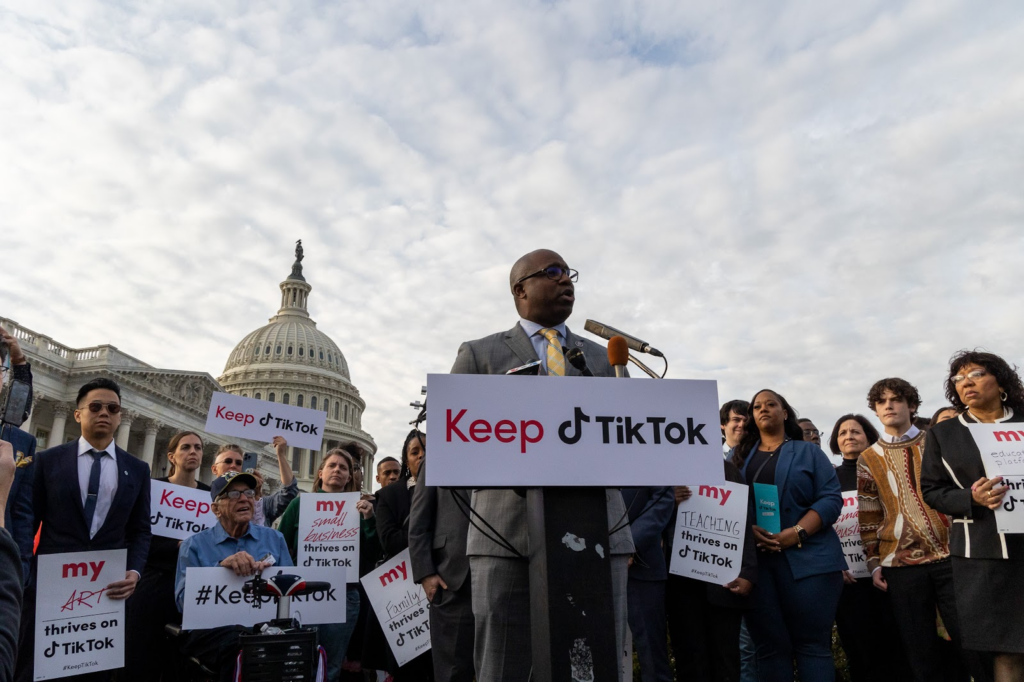Content creators rallied outside of the U.S. Capitol on March 22 in response to congressional talks of banning TikTok, a popular China-based social media application with over 1 billion users.
Congressman Jamaal Bowman (D-NY) organized a press conference with more than 20 social media content creators, including Naomi Hearts, Aidan Kohn-Murphy, founder of GenZforChange, and V Spehar to protest the possible TikTok ban. The content creators, whose combined digital following comprises over 60 million people, shared at the conference how the app has positively impacted their lives, small businesses and communities.
Bowman said banning TikTok will not solve the app’s underlying data and privacy issues.
“The rush to ban TikTok sets a dangerous precedent for our country by undermining our freedom of speech and distracts from the real issue: protecting Americans’ data and privacy,” Bowman said in a March 22 press release.
Senator Mark Warner (D-VA) introduced on March 7 the Restricting the Emergence of Security Threats that Risk Information and Communications Technology (RESTRICT) Act, which allows the federal government to regulate technology and applications that countries posing a national security threat produce. These nations, which the legislation dubs “foreign adversaries,” include China, Cuba, Iran, North Korea, Russia and Venezuela.
Meg Leta Jones, associate professor in the Communication, Culture & Technology Program at Georgetown University, a Masters of Arts degree focusing on the impact of technology on society, said conversations about the Tiktok ban stem from several concerns such as the app’s addictive nature, security concerns and international competition in the American technology sector.
A 2022 Pew Research Center study reported that 67% of U.S. teens have used TikTok and 16% of all teens say they use it almost constantly. Additionally, more than 150 million Americans, including 5 million U.S. small businesses, are on TikTok, according to the Bowman press release.
Bowman said the government needs to create all-encompassing regulations rather than banning one app and infringing on free speech rights.
“I, along with millions of others, use TikTok as a place to interact with my community in a positive, uplifting way,” the press release reads. “But this is not about defending TikTok as a company. We need strong regulation that applies to every platform in order to protect our data and especially our children. And we also have to protect young people’s right to free expression.”
Jones said there are many ways in which TikTok influences Americans.
“If the Chinese government is (or can become) involved in either the data collection or content delivery side, U.S. policymakers are concerned about everything from blackmail of U.S. officials to subtle anti-American messaging through influencers, hashtags, and imagery,” Jones wrote to The Hoya.
A bill to ban TikTok from government devices passed on Dec. 14, 2022 and remains in effect. Jones said other countries have begun to ban the app, and it is possible the United States will follow.
“Other countries like India have already banned TikTok and users turn to Reels,” Jones wrote. “Because there are only two mobile operating systems (Google’s Android and Apple’s iOS) with their own app stores for getting programs on phones, making an app illegal makes it fairly inaccessible because those two major tech companies will comply with U.S. law.”

Jones also said that a TikTok ban in the United States would go against certain American principles.
“The first is an open market global trade policy principle, which China has already complicated significantly, having long banned American tech companies like Google and Facebook,” Jones wrote. “The second is open access to information and expression. I’m not a First Amendment scholar, and there are surprisingly diverse opinions about whether a TikTok ban would violate the Constitution.”
Jones said that while it seems unlikely, if the ban were to pass, it would be influential in changing American society.
“TikTok’s massive popularity makes a ban seem unimaginable, but it reminds me of when a series of copyright cases swiftly demolished peer-to-peer music sharing in the early 2000s,” Jones wrote. “Apple made iTunes, and we all survived, but it was a pivotal moment in the history of music and technology. Banning TikTok and the regulation of social media across U.S. states may be a pivotal moment too.”




















